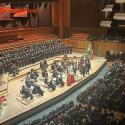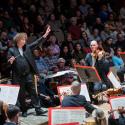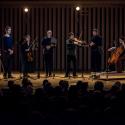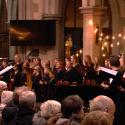Well, that's a first. With the final upbeat of the rustic second movement, Sir Roger Norrington Bugs Bunnied the audience. He turned to us with cheek in his eyes, a "That's-all-folks!" smile plastered on his face, brandishing his baton for a carrot, as if he and the Stuttgart Radio Symphony Orchestra had (yet again) just outwitted Elmer Fudd. The thought that Norrington's Mahler Nine would make me laugh had crossed my mind before the concert. But I had no idea that I'd be chuckling in a good way.
The intermittent stand-up (there was another attempt after the third movement that no one saw) was the only eccentricity that came totally out of the blue. The other bouts of nonconformism were as one might have expected from the septuagenarian troublemaker. His lifelong crusade for fidelity to the score and to historical practices was at the fore of this swansong concert with his orchestra of the past 13 years.
A complete ban on vibrato was in evidence from the off. For some, Mahler without vibrato is like Groucho Marx without the moustache. But whatever you think of the intellectual back-up for Norrington's claim that vibrato wasn't a technique that predominated in European orchestras until the 1940s, you cannot deny the extraordinary effect the thinning-out of the string sound had on the piece. The two ghosts that bookend the symphony have never floated so chillingly through the air.
The lack of vib in the monumental climaxes will have been more controversial. Some might have preferred and seen justification in seeing a greater warmth to these epic, fleeting visions of spring. I personally loved the way the untempered tone generated a lab-made intensity and, rather than enveloping me in a duvet, singed my eyebrows with a whip-crack flame.
This fire-breathing saw Mahler edging towards the Modernist explosions of the Second Viennese School. Norrington enjoyed looking forward. And sideways. His vivid, speedy, episodic treatment of the music (ever pungent; never indulgent) unmoored the piece from its 19th-century symphonic heritage and allowed it to assume - in its sharpness, compactness, density - some of the free-wheeling, disjointed qualities of Modernist poetry.
Of course, casualties were to be had from this approach. Long-term fluency, line and structure all collapsed in this Woody Allen-like mental and musical shuffling and affected deleteriously the peaks and troughs - which neither peaked nor troughed enough. It worried me at first. Surely our attention would drift without a clear purpose or a well-defined path? It might have, had it not been for Norrington's sense of colour and urgency.
The internal night music of the first movement was especially memorable: muted horns brayed obscenely; fortissimo trombones fell on strings pitilessly. The lolloping second movement was even better, with plenty of swaggering up to the ups and drunken down to the downs. By the end of the dance, Norrington accumulated such a vivid momentum I felt like the work was morphing into Prokofiev's Seventh Symphony. All of this was being aided by a terrific unity to the orchestral playing, with woodwinds in particular seeming to work with telepathic oneness.
One oddity was that the contrapuntal difficulties of the third movement seemed to slightly overwhelm Norrington. For a man who began his career cleaning out the cobwebs of Renaissance polyphony, I didn't really understand that. But I guess it wasn't helped by his insistence on changing gear always at full tilt. It didn't stop him from mining his choral experience for the final movement, which, taken at speed and with a chilly but full tone, became an enormous Bach chorale.
As a farewell to the orchestra, Norrington ended the night with a performance of the small, quiet, falteringly brooding Elegy by Edward Elgar. A touching encore. A helpful balm to haunted thoughts. What a surprisingly affecting evening.
- Listen again for the next seven days on the BBC iPlayer via the Proms website
- theartsdesk's pick of the Proms
- theartsdesk's BBC Proms 2011 complete listings















Add comment